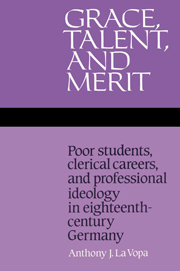 Grace, Talent, and Merit
Grace, Talent, and Merit Book contents
- Frontmatter
- Contents
- Acknowledgments
- Introduction
- PART I POOR STUDENTS
- PART II CALLING, VOCATION, AND SERVICE
- 5 The calling: August Hermann Francke and Halle Pietism
- 6 Vocation: the natural self and the ethic of reason
- 7 Meritocracy: language and ideology
- 8 The egalitarian alternative: theory and practice
- PART III NEW DEPARTURES
- Epilogue
- Bibliographical note
- Index
6 - Vocation: the natural self and the ethic of reason
Published online by Cambridge University Press: 26 March 2010
- Frontmatter
- Contents
- Acknowledgments
- Introduction
- PART I POOR STUDENTS
- PART II CALLING, VOCATION, AND SERVICE
- 5 The calling: August Hermann Francke and Halle Pietism
- 6 Vocation: the natural self and the ethic of reason
- 7 Meritocracy: language and ideology
- 8 The egalitarian alternative: theory and practice
- PART III NEW DEPARTURES
- Epilogue
- Bibliographical note
- Index
Summary
“How easy it was for me to return home,” Israel Hartmann wrote to his nineteen-year-old son Gottlob David in October 1771, “as soon as I had the slightest sign [Spur] that you would let God work in your heart.” Hartmann had accompanied his son to Tübingen, where he was to begin his studies in the theological Stift after four years as a cloister school pupil. Long overdue, the sign proved illusory. The extensive correspondence between father and son records a classic discord, already audible several years before 1771 and reaching the point of shrill exasperation on both sides during Gottlob David's two-year tenure at the Stift.
“I dedicated you as the firstborn to the service of the church,” Israel Hartmann reminded his son in December 1771, and as a child “you wanted to hear of nothing else.” But by the end of his first semester Gottlob David was pleading with his father to allow him to leave the Stift after the initial two-year course in philosophy, so that he could pursue an academic career in that subject outside Württemberg. Aside from balking at the prospect of at least three more years as a penurious student, he was unwilling to endure the intellectual “slavery” and “oppression” imposed by the Orthodox clerical establishment of his fatherland. If required to remain in Tubingen to complete his theological studies, he warned his father, he would have to confine himself to his room for the duration. In the fall of 1773, after completing a Magister degree in philosophy, he accepted a teaching appointment at the gymnasium that Duke Peter of the Curland had recently established in Mitau.
- Type
- Chapter
- Information
- Grace, Talent, and MeritPoor Students, Clerical Careers, and Professional Ideology in Eighteenth-Century Germany, pp. 165 - 196Publisher: Cambridge University PressPrint publication year: 1988


